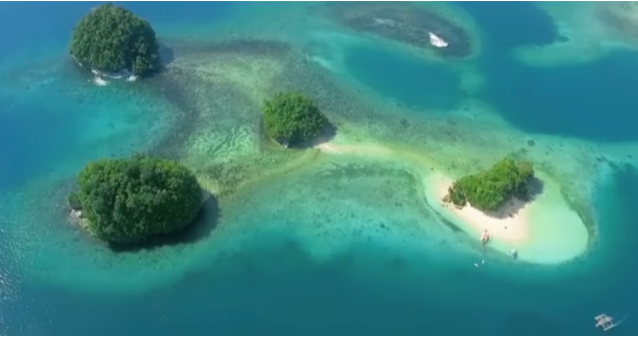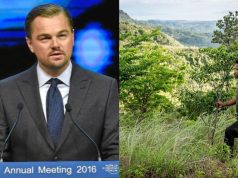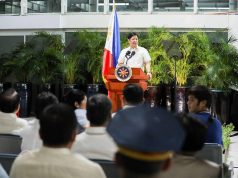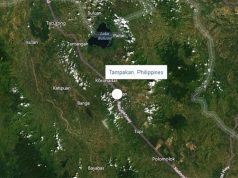SAN NARCISO, Zambales – The Department of Environment and Natural Resources should go beyond being just a regulator and must be more developmental, DENR Secretary Gina Lopez said at a recent forum with local officials where she bared her environmental and economic programs.
Speaking Friday at the Vice Governors’ League held in San Narciso, Zambales, Lopez claimed only foreign countries benefit from the Philippines’ natural resources, leaving Filipinos, who should be primary beneficiaries of the resources, in abject poverty. This can change, she said, if the DENR were to be more active in ensuring that natural resources are exploited mainly to help benefit people and not just grow the business of multinationals and large local firms.
As an example, she cited mining in Dinagat Islands since 1939. Yet, she said, the place remains in poverty. In one of her visits to Dinagat Islands lately, a councilor told her that the area boasts of 182 eco-tourism sites, hundreds of caves and a bonsai forest. “And yet they remain in poverty. I don’t understand,” Lopez told the vice governors at Friday’s forum.
Lopez said it is not right for large foreign corporations to rake in huge profits from Philippine resources and leave the locals in hunger.
“They are making lots of money from our resources. Is this right? Why don’t we make money from our resources?
“I just want to impress in you that we are so blessed. Yes, we are a very mineralized country but at the end of the day, you make your choices,” she told the gathering of provincial officials.
“They (foreign corporations) want our minerals and take 95 percent of the local economy? Or do you want to keep our biodiversity as our gift to the planet and let our people benefit? What is your choice?”
Lopez in February announced the closure of 21 mining firms for allegedly destroying bodies of water. Seven of these firms operate in Dinagat Islands, six in Surigao del Norte and four in Zambales. Two weeks later, she announced the cancellation of 75 Mineral Production Sharing Agreements to protect, she said, the country’s watersheds: 37 in Mindanao, 11 in Visayas and 27 in Luzon.
The twin moves were criticized by mining groups who said these would leave many members of the affected communities jobless.
Last week, the DENR chief bared her “E3″ (environmental, economic and educational) development plan and even announced her plan to work with the communist New People’s Army in developing Agusan del Sur, where the rebel group operates, into a model of her E3 thrust. The military immediately cautioned Lopez against pushing through with her plans to work with the NPA.
The chief political consultant of the National Democratic Front (NDF) of the Philippines, Jose Ma. Sison, however, welcomed Lopez’ initiatives and even invited her to attend the next round of on-going peace talks between the Government of the Republic of the Philippines and the NDF in June this year.
In baring her plan, Lopez stressed that the DENR had set aside P6 billion for the establishment of E3 zones all over the country.
“The goal is not money, the goal is happiness,” she explained. She cited as an example that in Bhutan, there are not even a million people there and they have $2 billion every year. “Their goal is not money, zero crime, zero drought, very little poverty, free health, free education. Why don’t we do that here?”
She explained the rationale of her program: “What is important is biodiversity. Endemicity is where the biodiversity can be found there and only there: exclusive, endemic. Philippines has the greatest endemicity per unit area.”
India, she said, is the number three country in terms of pharmaceuticals based on plant medicine, and that the global pharmaceuticals earn $300 billion annually.
“Do you know how much you can get from one medicinal plant? P25 million dollars every year. We spend P10 million pesos to find out its medicinal value. And we don’t have to do that because the katutubo (indigenous peoples) already know that. They just don’t have the scientific studies. But we can spend on that.”
She also lamented that other Philippine products are being patented and produced by other countries to the detriment of the Filipinos.
“Nata de coco, that is Filipino but who patented that? Japan. Ampalaya, Vitamin-A rich, our ampalaya, who patented that? America. Ampalaya mixed with eggplant as a cure for diabetes, who patented that, a research firm in New Jersey”
“They are making lots of money from our resources. Is this right?”
“When I went to Pangasinan, do you know Ilang-ilang, the whole barangay was planting ilang-ilang. Do you know who patented that? Yves Saint Laurent (YSL),” Lopez lamented.
National industrialization of major industries, including the pharmaceutical industry, and the protection of the environment are major components of the NDF’s 12-point program.
Lopez cited environmental projects that she did as ABS-CBN Foundation head, where, she claimed, project proponents and beneficiaries are uneducated, yet are earning now. Lopez said these projects can now be duplicated in various parts of the country to benefit more people.
“That is why I am (saying), at DENR, we just don’t have to be regulatory. We have to be developmental,” she explained.
“Let us create Area Development Teams in every area, and we can help you do development plans for your respective areas, then we would know the one with the greatest impact and then we can help finance it,” she told the country’s vice governors.
A representative from Tawi-tawi stood up and said his place produces seaweeds, and lamented the fact that for lack of a processing facility, all their products are being made for export. Lopez immediately committed to help Tawi-tawi in setting up a seaweed processing plant, and urged other leaders to think of ways to help their local economy.
“Do you know, for example, that if you plant 5,000 hectares of bamboo, on the 4th year when you start harvesting, you can make up to a P100 million net every year?” she claimed.
“In Dinagat, we want to do eco-tourism, agriculture and value added like health. If you look at the world scenario, the price of gold goes up-down-up-down. But if you look at the health and welfare, it is in a steady incline 20 per cent every year, (translating) to trillions of dollars. And who has the endemicity to satisfy the need for health? Philippines. And the foreigners are using our resources and they are making money. It is not right at all,” she said.
Lopez’s vision for the DENR as extending beyond its role as regulator could draw controversy, however, given past observations that she could be over-reaching and encroaching on the concerns of other agencies like agriculture, tourism and the NEDA.










